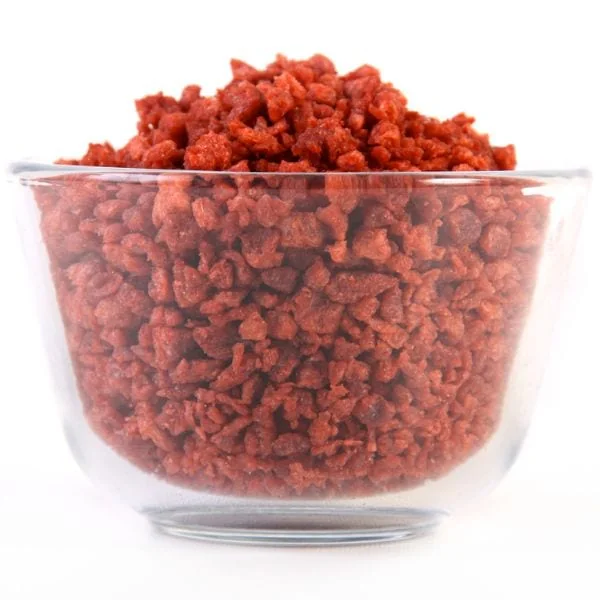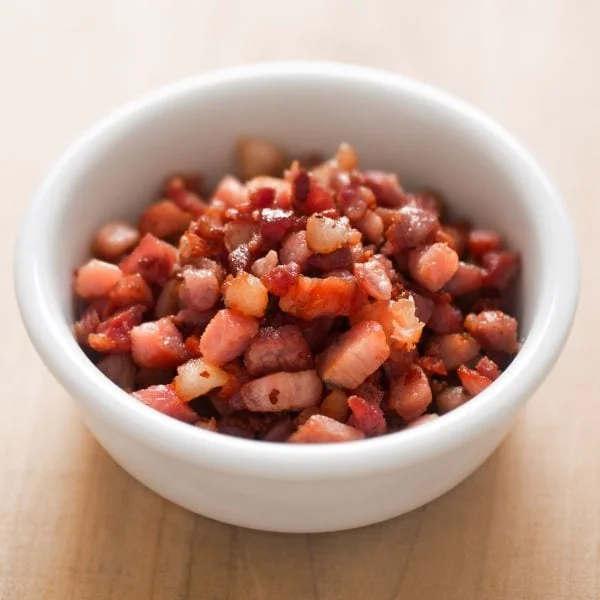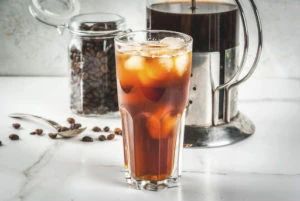While we know that you are probably snickering at the title, the answer to this question might be of interest to you: Are bacon bits vegan?
Oddly enough, most of them ARE.
As the goal of bacon bits is to add a bacon-flavored crunch or bit of texture to salads, these popular salad-toppers are almost always essentially dyed proteins, in most cases made from soy. Mind you, there ARE plenty of bacon bits that have real bacon, it’s just that the majority of them don’t.
We realize that this sounds a bit on the weird side but stay with us. Today we’ll explore the ‘wide world of bacon bits’ to explain how with this product, vegan ingredients are actually ‘the default’ – you’ve just gotta know what to check for!
The first reason for vegan-friendly bacon bits is production costs and longevity

When you are making a product, especially something that you want to sell globally, then you want to find ingredients that can provide the tastes and textures that your customers are looking for, preferably with as long of a shelf life as possible.
For this reason, soy flour is an extremely cost-effective and practical choice for making ‘bacon’ bits. They can be cooked with the addition of salt and canola oil, and generally, caramel and red 40 dye will be added for color.
Finally, liquid smoke is often the key to the really tasty bits, and we’ll talk about that a little more in this article later (and you won’t miss that, hint-hint, because it’s good news for vegans!).
As far as shelf-life advantages, while ‘real’ bacon bits might last 6 weeks in your refrigerator or up to 6 months in the freezer, soy flour bacon bits are usually given an expiration date of 24 months from the day that they were manufactured.
If you’ve ever snacked on some ‘expired’ soy bacon bits, you may not even know the difference – they’re practically an ‘immortal condiment’ – but please DO replace them when they expire, as those dates are there for good reason!
So, bacon bits really aren’t made of bacon at all?
Just to make sure that we’re crystal clear on this, MOST bacon bits aren’t real bacon, but there are lots and lots of exceptions. The labeling will ALWAYS tell you if there is real pork inside, not only because of the reduced shelf life and greater risk of food poisoning should it go bad but also because many consumers do not ingest pork for spiritual reasons.
This will help you quite a bit when you want to add some vegan-friendly bacon bits to your salad, but cannot find your usual trusted brands. You’ll still need to read the label, of course, but the list won’t usually be overcomplicated.
With that in mind, let’s look next at some ingredients that you may want to keep an eye out for:
Are there any ingredients in imitation bits to watch for?
Probably the best way to quantify the problem ahead of you when picking out vegan-friendly bacon bits is to give you an actual example, in this case, McCormick’s Imitation Applewood Smoked Bacon Bits. We’ll list out the ingredients and then we’ll tell you a little about each in the sections that follow.
McCormick® Imitation Applewood Smoked Bacon Bits
Ingredients:
- Textured Soy Flour
- Canola Oil
- Salt
- Caramel Color
- Natural and Artificial Flavor
- Yeast Extract
- FD&C Red No. 40
- Natural Applewood Smoke
- Disodium Inosinate
- Disodium Guanylate
Textured Soy Flour
The most important part of the product, textured soy flour, is definitely vegan and makes textured soy proteins possible. So, this one’s okay.
Canola Oil
A healthy cooking choice and also vegan-friendly, this is just a cooking oil derived from the rapeseed plant. We’ll give this one a pass, as well!
Salt
Extracted from mines, not animals, salt is always a safe ingredient.
Caramel Color
While it might sound like there’s dairy hidden in it, caramel color is typically going to be derived from sources like corn syrup, potatoes, or wheat. While lactose would technically be allowed as an ‘acceptable carbohydrate’, unless you’re dealing with fancy candies this will almost never be present.
Natural and Artificial Flavor
This ingredient is your first sign of trouble. Whenever you see ‘natural flavor’ on an ingredients list, this is a broad definition that could mean flavors that are derived from either animal or plant sources. The bottom line is if an ingredient is purposely vague, it’s probably wise not to trust it.
Yeast Extract
While yeast is a living thing, this little wonder is considered neither plant nor animal – it’s actually a single-celled type of fungus that you’ll find on plants in nature. As such, most vegans are perfectly fine with extracts associated with yeast.
FD&C Red No. 40
Red 40 is going to be considered a ‘judgment call’ ingredient for vegans. While the color itself is derived from petroleum and not animals, the safety of these colorations has been validated through routine testing on animals.
Since this product is strictly about aesthetics, many vegans feel that it is not only cruel but unnecessary. As dyes are quite difficult to avoid, however, whether or not you will consume it is going to be up to you to decide.
Natural Applewood Smoke
Natural smoke flavors are definitely vegan and we’ll talk a little more about these later in this article, but at their most basic, smoke flavors are obtained by burning wood and running the smoke through a condenser, so that you get a flavorful liquid that captures the distinctive taste. That makes this ingredient vegan-friendly and also a great reason to love science!
Disodium Inosinate
Disodium Inosinate is another red flag ingredient that you’ll need to know about when you are shopping for vegan-friendly foods. Typically listed under the words ‘flavor enhancers’, this ingredient is USUALLY derived from meat.
While some may be derived from tapioca starch, you’ll need to confirm with the company that produces a product whether or not this is the case. If you can’t confirm, then it’s best to assume that it is meat derived and simply look for another product.
Disodium Guanylate
This ‘disodium’ flavor enhancer is actually the inverse of ‘disodium inosinate’, in that disodium guanylate is ALMOST always vegan, although it may still warrant a check, as there are exceptions that have been processed with or derived from non-vegan sources.
Watch out for additional ingredients such as honey or any vague ‘meat flavoring’ type references, of course, but as McCormick’s is an industry leader, this example should be a fairly viable representation of most of the popular brands of imitation bacon bits that you’ll see.
What are some examples of vegan-friendly brands?
While we’re on the subject of vegan bacon bits, we thought that we should share some popular brands that are considered vegan-friendly so that you can look for them on the web, do a little research of your own, and decide if they might be a product that you wouldn’t mind stocking in your pantry.
Let’s take a look and see what you think!
All Y’alls Foods – It’s Big Crunchy Bacony Bit’s Ya’ll
Plant-based, gluten-free, and non-GMO – along with a Texas old-west style packaging that definitely got a little Wild West character—All Ya’lls Foods ‘It’s big, crunchy bacon bits ya’ll’ is one of the more colorful options for discerning vegan palates that want a little imitation bacon flavor to spice up their salads.
Made in the USA, a portion of proceeds from sales also goes to the ‘Rowdy Girl Sanctuary’, which is a safe haven for farm animals. If this sounds like a good fit for you, then be sure to take a peek via the link to learn more!
Delish Imitation Bacon Bits
This brand touts itself as vegetarian, but it’s actually quite popular with many vegans and so we wanted to include it. Delish, based out of north Hollywood in California, has been providing quality organic and all-natural products since 1992, so they’re definitely a brand that you might want to take a close look at.
As far as these bits, they are made from soy flour, non-GMO, and gluten-free, and as they come in large packets, you’ll have all the imitation bacon bits you like for adding a little smoky zing to your favorite salads and snacks!
Badia Imitation Bacon Bits
Badia is another option that we hear a lot about from the vegans who love it. These bacon bits have a nice, smoky flavor and stay crunchy even in your mashed potatoes. The ingredients seem to fit, but we should mention that Red and Red 40 are listed so these may not be a perfect fit for everyone.
That said, if dyes are not a part of your personal veganism, then be sure to take a closer look at Badia’s bits – they really have some good worth of mouth going for them and they might just be your next flavorful favorite to your vegan pantry at home.
Louisville Vegan Toppin’s Bacon Bits
Our final entry is these Louisville Vegan Toppin’s Bacon bits and not only do they taste fantastic, but they use beet dye and not that pesky Red 40 so this is one that ALL vegans can enjoy without worry. Hand-seasoned, these imitation bacon bits are great to eat right out of the packet or fried up for a little extra crispness.
Touted as ‘soy jerky’, we should also mention that these bacon bits and soy protein imitation meat salad toppers come in a number of interesting flavors, with maple bacon and even General Tso’s chicken being options – you really don’t see that every day and when you do come across it, they usually aren’t taking the care to use ingredients like beet dyes. As such, we really recommend a closer look at Louisville and their products!
Homemade vegan bacon bits recipe

Probably the best way to make sure that your ‘vegan bacon bits’ are completely, 100% vegan is to simply roll up your sleeves and whip them up yourself. To that effect, we have a recipe that comes to us courtesy of Liz Madsen and Zardyplants and we think you’re going to love it. Let’s take a look at what you need and how it’s done and we highly recommend that you visit Zardyplants for the original recipe and a few extra tweaks and tips for this recipe and to see some of their other dishes!
Ingredients:
- ½ – 1 tsp freshly cracked black pepper
- 1 cup Textured vegetable protein
- 1 tbsp applewood (or your favorite) spice rub
- 1 tsp hickory or mesquite liquid smoke
- 2 tbsp apple cider vinegar
- 2 tbsp maple syrup
- 2 tsp smoked paprika
- 6 tbsp gluten-free tamari or reduced-sodium soy sauce or
Steps to make:
- Start off by whisking up your marinade ingredients – everything BUT the vegetable protein – in a medium-sized mixing bowl.
- When it’s all good and mixed up, start stirring in your vegetable protein with a rubber spatula or whatever you’ve got handy that won’t scratch the bowl, and once it’s all coated then let it sit for a good 8 – 10 minutes to soak up all that flavor.
- Once you’ve put aside your veggie protein to soak, then go ahead and preheat your oven to 375 degrees, and get yourself a lined cookie sheet ready. Once your 8-10 minute soaking time is done, spread the protein out on your cookie sheet and bake for 8 to 10 minutes if you want chewy bits, or 10-15 minutes if you want crunchy ones. Be sure to check them and stir them a bit every 5 minutes until done for best results.
- You can use these right away, store them for up to a week in the fridge, and or for a good 2 -3 months in the freezer – a quick pan fry should get them nice and extra crispy if you like. Congratulations, you’ve now made vegan bacon bits without any of the pitfalls of the commercial offerings. Enjoy!
Protip: stock up on liquid smoke
We’d mentioned this before and wanted to just come back to this for a moment, but liquid smoke is almost always vegan and you can easily find and stock up on a number of varieties that will give you meaty flavor without any actual meat. You’d be surprised how many recipes you can sneak this into and really zest up the flavor, so consider adding a few different kinds of vegan-approved liquid smoke products to your pantry – they’re well worth the investment when it comes to flavor!
FAQs
The clock is ticking and it’s just about time to wrap things up, but before we go we wanted to share some frequently asked questions about vegan bacon bits that we thought you might find useful. Let’s take a peek!
Can I just fry up vegan bacon to make my own vegan bacon bits?
That’s going to really depend on the type of vegan bacon that you are using. If they are made from pe or soy protein, then you might make a yummy batch of bacon bits out of them that will work a treat for your salad, but some types of vegan bacon will be tofu on tempeh strips so if you make bacon bits from two different types of vegan bacon, you’ll likely get two very different results. A big reason for this is how they are flavored – some might use liquid smoke, while other types use mushroom flavoring to add a meaty taste to their product.
It’s a lot easier to purchase them pre-made or simply make your own with textured vegetable protein if you are looking to make a fresh batch.
How long does vegan bacon last once opened if I want to make some into bacon bits?
Once you’ve opened the package, your vegan bacon is usually good for about 48 hours, but consult the packaging for your particular brand to be sure. If you’re going to make bacon bits, you could make a large batch and freeze the bits in separate containers so that you can get the most mileage out of your vegan bacon package.
Freezer storage time will vary, but usually it will be good for a month or two in the freezer.
Do vegan bacon bits have nitrates?
About 80% of nitrates are plant-derived, so it’s possible that you might find them in a vegan product, but highly unlikely. Vegan products most commonly will have no added nitrites or nitrates in them, so if you see them on the label, then take it as a red flag that you should look into the product to make sure that nothing sneaky is going on in the labeling.
Some final words on vegan bacon bits
So, are bacon bits vegan? Well, in most cases, the answer is ‘YES’. It seems a little odd, but with bacon bits unless the product says that it uses real bacon, the odds are that you will find vegetable proteins or soy flour when you check the ingredients.
It makes sense – dried, fried, or just about any way it’s prepared, bacon is still pork and so it’s got a limited shelf life. By making imitation bacon bits out of soy, the taste of bacon can be added to salads but the product may be produced cheaply and will last a long time on the shelves.
As always, be vigilant with labels that you read when shopping for imitation bacon bits but for once you’ll be getting a bit of a break – most commercial bacon bits act as a kind of shining example of how you can get meat flavor without any actual meat, so shopping for them is almost always a breeze!
That’s all the time that we have for today, but thanks so much for reading and we hope to see you again sometime soon!










David learned to cook at an early age after his mother told him that he couldn't live on pizza forever, Dave uses his modest kitchen skills to recreate sorely-missed recipes from home and to occasionally make new favorite ones from places he is visiting.